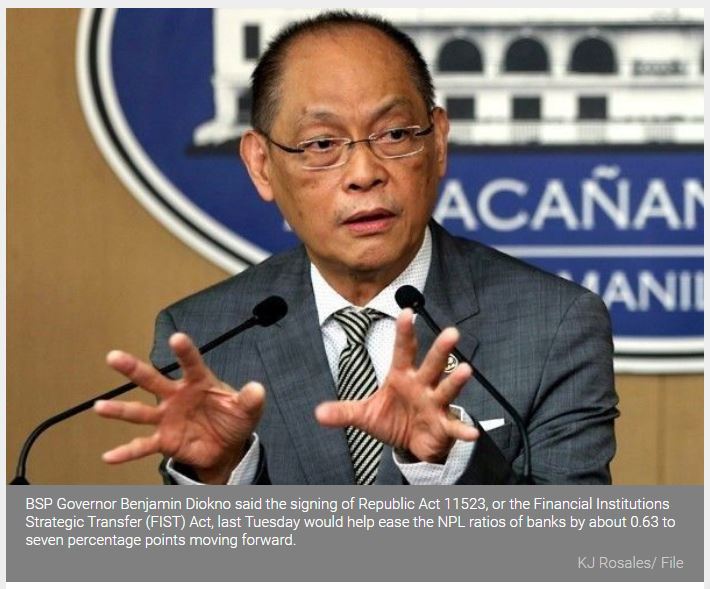Philippines: FIST to cut banks’ bad loans – BSP
MANILA, Philippines — The new law aiming to help banks get rid of their bad loans will cut down the industry’s non-performing loan (NPL) ratio by as much as seven percentage points, according to the Bangko Sentral ng Pilipinas.
BSP Governor Benjamin Diokno said the signing of Republic Act 11523, or the Financial Institutions Strategic Transfer (FIST) Act, last Tuesday would help ease the NPL ratios of banks by about 0.63 to seven percentage points moving forward.
“FIST law will allow banks to easily dispose bad assets through asset management companies,” Diokno said.
He said the new law would help keep the banking system stable despite the effects of the COVID-19 pandemic.
The new law is similar to Republic Act 9182, or the Special Purpose Vehicle Act of 2002, which allowed the establishment and registration of special purpose vehicles to acquire non-performing assets and dispose them in the markets after the Asian financial crisis in 1998.
NPLs or bad debts refer to past due loan accounts where the principal or interest is unpaid for 30 days or more after due date. A high NPL ratio indicates weakness in the financial system and poor state of the economy.
Latest preliminary data from the central bank showed the industry’s NPL ratio eased to 3.61 percent in December after accelerating for 11 straight months to 3.78 percent in November.
This was the highest gross NPL ratio since the 3.48 percent booked in January 2013. Data prior to 2013 are not consistent with the Department of Supervisory Analytics as the financial reporting package started that year.
Soured loans of the banking industry soared 74.8 percent to P391.66 billion in end-2020 from P224.1 billion in end-2019. This was slightly lower than the record P404.69 billion in end-November last year.
Likewise, past due loans referring to all types of loans left unsettled beyond payment date jumped 62.1 percent to P482.11 billion from P297.25 billion, while restructured loans reached P207.278 billion in end-2020 or 4.8 times the P43.16 billion recorded in end-2019.
Diokno said the draft implementing rules and regulations (IRR) is now being circulated to the industry for comments.
“Anticipating the signing of the FIST bill into law, the draft IRR is already with Securities and Exchange Commission, with inputs from BSP, as the lead agency,” he said.
The level of bad debts and NPL ratio of the sector are seen rising further as the debt holiday extended by a new law expired in December. Congress has granted debt moratoriums including 30 days under Republic Act 11469 or Bayanihan to Heal as One Act that expired last June 24 and another 60 days under RA 11494 or Bayanihan to Recover As One Act or Bayanihan 2 that lapsed last December.
Cezar Consing, president of Bankers Association of the Philippines (BAP), said the capital that would be freed from the sale of non-performing loans and assets under the FIST law could be used to boost lending activities.
“The FIST will allow banks to shed their non-performing loans and assets, probably at a discount to their original values, but with minimum friction costs,” he said.
Consing, who is also president of Ayala-led Bank of the Philippine Islands, said higher lending would help economic recovery as the BAP expects NPL ratio to peak at six to seven percent, lower compared to the peak recorded during the Asian financial crisis.
“Think of FIST as a medicine that clears the system and allows for greater activity,” he said.
Earnings of Philippine banks slumped to a four-year low after declining by 32.8 percent to P154.96 billion last year from a record P230.67 billion in 2019 as the industry’s provision for potential loan losses arising from the impact of the global health pandemic almost quadrupled.
Last year’s decline ended four straight years of profit growth for the banking sector and was the lowest since the P153.31 billion booked in 2016.
As more borrowers default on loan payments due to the impact of the pandemic, banks have been sacrificing earnings to raise provisions for credit losses on loans and other financial assets to P210.89 billion last year or almost four times the P52.89 billion allocated in 2019.
Source: https://www.philstar.com/business/2021/02/18/2078479/fist-cut-banks-bad-loans-bsp


 Thailand
Thailand




